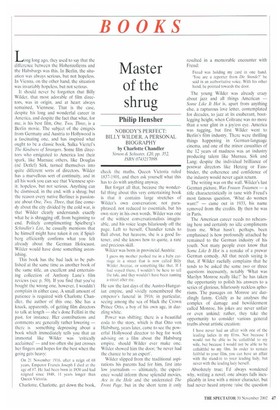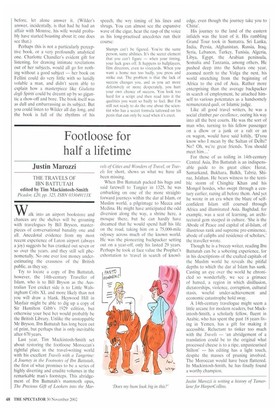Master of the shrug
Philip Hensher
NOBODY'S PERFECT: BILLY WILDER, A PERSONAL BIOGRAPHY by Charlotte Chandler Simon & Schuster, 120, pp. 352, ISBN 0743217098 Long long ago, they used to say that the difference between the Hohenzollerns and the Habsburgs was this. In Berlin, the situation was always serious, but not hopeless. In Vienna, on the other hand, the situation was invariably hopeless, but not serious.
It should never be forgotten that Billy Wilder, that most adorable of film directors, was in origin, and at heart always remained, Viennese. That is the case, despite his long and wonderful career in America, and despite the fact that what, for me, is his best film, One, Two, Three, is a Berlin movie. The subject of the emigres from Germany and Austria to Hollywood is a fascinating one, and has inspired what ought to be a classic book, Salka Viertel's The Kindness of Strangers. Some film directors who emigrated to America lost their spark, like Murnau; others, like Douglas (ne Detlef) Sirk, turned themselves into quite different sorts of directors. Wilder has a marvellous sort of continuity, and in all his work you can see that Viennese spirit; hopeless, but not serious. Anything can be dismissed, in the end, with a shrug; but the reason every native Berliner is passionate about One, Two, Three, that fine comedy about the city divided by the cold war, is that Wilder clearly understands exactly what he is shrugging off, from beginning to end. Politely complimenting Spielherg's Schindler's List, he casually mentions that he himself might have taken it on; if Spielberg efficiently confirms what you felt already about the German Holocaust, Wilder would have done something astonishing.
This book has the bad luck to be published at the same time as another book of the same title, an excellent and entertaining collection of Anthony Lane's film reviews (see p. 50). If you find that you've bought the wrong one, however, I wouldn't complain in either case. A small amount of patience is required with Charlotte Chandler, the author of this one. She has a knack, apparently, of getting film directors to talk at length — she's done Fellini in the past, for instance. Her contributions and comments are generally rather lowering — there is something depressing about a book which immediately tells you that an immortal like Wilder was critically acclaimed' — and too often she just crosses her fingers and hopes for the best when the going gets heavy:
On 21 November 1916, after a reign of 68 years, Emperor Francis Joseph I died at the age of ST He had been born in 1830 and had reigned since 1848, 11 years longer than Queen Victoria.
Charlotte, Charlotte, get down the book, check the maths, Queen Victoria ruled 1837-1901, and then ask yourself what this has to do with anything anyway.
But forget all that, because the wonderful thing about this very entertaining book is that it contains large stretches of Wilder's own conversation; not paraphrased, not reduced to essentials, but his own story in his own words. Wilder was one of the wittiest conversationalists imaginable, and his voice leaps hilariously off the page. Left to herself, Chandler tends to flail about, but heavens, she is a good listener, and she knows how to quote, a rare and precious skill.
Wilder was born in provincial Austria: guess my mother pushed me in a baby carriage in a street that is now called Billy Wilder Avenue, or something like that. If I had stayed there, I wouldn't be here to tell the tale, and they wouldn't have been naming a street after me.
He saw the last days of the Austro-Hungarian empire, and vividly remembered the emperor's funeral in 1916; in particular, seeing among the sea of black the Crown Prince Otto, a boy of his own age, in dazzling white.
Power was shifting; there is a beautiful coda to the story, which is that Otto von Habsburg, years later, came to see the powerful Hollywood director to beg for work advising on a film about the Habsburg empire, should Wilder ever make one. Wilder showed him the door; 'he never had the chance to be an expert'.
Wilder slipped from the traditional aspirations his parents had for him, first into low journalism — ultimately, the experience would inform those splendid movies, Ace in the Hole and the underrated The Front Page, hut in the short term it only
resulted in a memorable encounter with Freud:
Freud was holding my card in one hand. 'You are a reporter from Die Stunde?' he said in an authoritative voice. With his other hand, he pointed towards the door.
The young Wilder was already crazy about jazz and all things American — Some Like It Hot is, apart from anything else, a rapturous love letter, contemplated for decades, to jazz at its exuberant, bootlegging height, when Coltrane was no more than a sour glint in a joyless eye. America was tugging, but first Wilder went to Berlin's film industry. There were thrilling things happening in German-language cinema, and one of the minor casualties of the 12 years of madness was an industry producing talent like Murnau, Sirk and Lang; despite the individual brilliance of postwar directors like Herzog or Fassbinder, the coherence and confidence of the industry would never again return.
The writing was on the wall. Wilder's last German picture, Was Frauen Traumen — a title characteristically in tune with Freud's most famous question, 'What do women want?' — came out in 1933, his name removed from the credits. By then he was in Paris.
The American career needs no rehearsing here and certainly no idle compliments from me, What hasn't, perhaps, been emphasised is how profoundly attached he remained to the German industry of his youth. Not many people even know that Some Like It Hot is a remake of a prewar German comedy. All that needs saying is that, if Wilder ruefully complains that he tends to be asked the same two or three questions incessantly, notably 'What was Marilyn Monroe really like?' he has taken the opportunity to polish his answers to a series of glorious, hilariously reckless aphorisms. The passages on Monroe are dazzlingly funny. Coldly as he analyses the complex of damage and bewilderment called Monroe, his jokes are never unfair or even unkind; rather, they take the opportunity to consider various general truths about artistic creation:
I have never had an affair with one of the leading ladies in my films. Not because I would not be able to be unfaithful to my wife, but because I would not be able to be unfaithful to my film. In order to remain faithful to your film, you can have an affair with the stand-in to your leading lady, but never with the leading lady herself.
Absolutely true; I'd always wondered why, writing a novel, one always falls inexplicably in love with a minor character, but had never heard anyone raise the question before, let alone answer it. (Wilder's answer, incidentally, is that had he had an affair with Monroe, his wife would probably have started boasting about it; one does see that.)
Perhaps this is not a particularly perceptive book, or a very profoundly analytical one. Charlotte Chandler's evident gift for listening, for drawing intimate revelations out of her subjects, would all go for nothing without a good subject — her book on Fellini could do very little with so luridly voluble a man, and didn't seem able to explain how a masterpiece like Giulietta degli Spiriti could be dreamt up by so gigantic a show-off and bore. The book itself was as dull and embarrassing as its subject. But you could listen to Wilder all day long, and the book is full of the rhythms of his
speech, the wry timing of his lines and shrugs. You can almost see the expansive wave of the cigar, hear the rasp of the voice as his long-practised anecdotes run their course:
Slumps can't be figured. You're the same person, same abilities. It's the secret element that you can't figure — when your timing, your luck goes off. It happens to ballplayers, film directors, even to vineyards. When you want a home run too badly, you press and strike out. The problem is that the lack of success changes you, and as you act more defensively or more desperately, you hurt your own chance of success. You look too hard for a script and then read into it the qualities you want so badly to feel. But I'm still not ready to do the one about the scientist who has a secret formula tattooed on his penis that can only be read when it's erect.



























































































 Previous page
Previous page